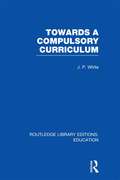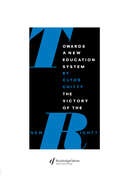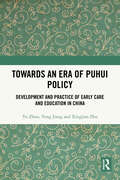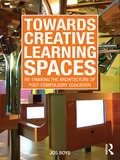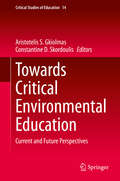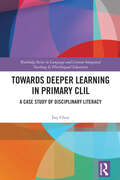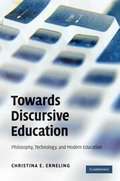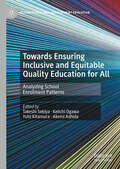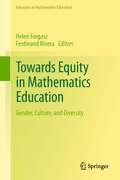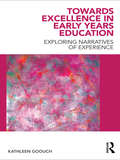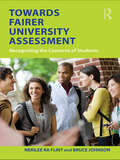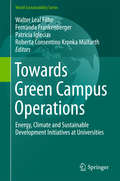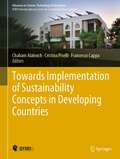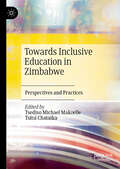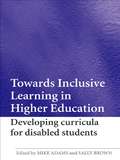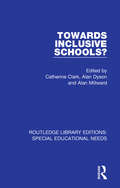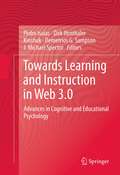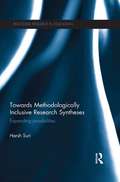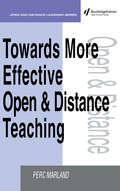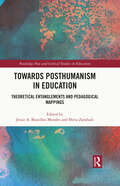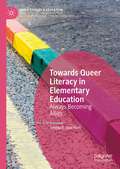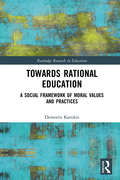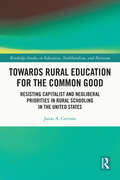- Table View
- List View
Towards A Compulsory Curriculum (Routledge Library Editions: Education)
by John P. WhiteWritten prior to the introduction of the national curriculum, this volume argued for precisely that: a broad framework of a compulsory education at national level for all schools. The author considers the question of the content of his proposed compulsory curriculum in terms of principles derived from a fundamental ethical position and from an analysis of kinds of human activity that seeks to establish important educational priorities. The discussion covers arguments concerning intrinsically worthwhile activities, the need for a practical component of the curriculum and the priority that humanistic studies should have. It puts forward a case for a new concept of voluntary education, partly on the model of the Pioneer organizations of Eastern Europe, to supplement the compulsory curriculum.
Towards A New Education System: The Victory Of The New Right?
by Clyde Chitty University of Birmingham.First published in 1989. Routledge is an imprint of Taylor & Francis, an informa company.
Towards An Era of Puhui Policy: Development and Practice of Early Care and Education in China
by Yu Zhou Yong Jiang Xingjian ZhuIn China, the puhui (普惠) early care and education (ECE) program, a national public policy, was officially launched in 2010 to improve the affordability, accessibility, and quality of ECE. Based on a five-year research project, this book explores the development and practice of this ambitious reform campaign with national empirical evidence.The authors evaluate the puhui ECE system (e.g., puhui early education policy, puhui kindergarten services, puhui child care services, and total teacher compensation) from the perspective of universal ECE provision for all children. They focus on children from disadvantaged families such as migrant children, children with special needs, and children from low socioeconomic families by emphasizing the targeted provision of ECE based on the principle of educational equity. In addition, they explore the innovative ways to optimize the structure, quality, and efficiency of puhui ECE provision by introducing an innovative provider with the participation of social organizations (China Welfare Institute) and three innovative forms of provision, including village kindergarten, small-scale urban kindergarten, and compensation for children with special needs.The book will be of interest to policymakers, scholars, and researchers in early childhood education, education policy, and education development.
Towards Creative Learning Spaces: Re-thinking the Architecture of Post-Compulsory Education
by Jos BoysThis book offers new ways of investigating relationships between learning and the spaces in which it takes place. It suggests that we need to understand more about the distinctiveness of teaching and learning in post-compulsory education, and what it is that matters about the design of its spaces. Starting from contemporary educational and architectural theories, it suggests alternative conceptual frameworks and methods that can help map the social and spatial practices of education in universities and colleges; so as to enhance the architecture of post-compulsory education.
Towards Critical Environmental Education: Current and Future Perspectives (Critical Studies of Education #14)
by Aristotelis S. Gkiolmas Constantine D. SkordoulisThis volume discusses theory, philosophy, praxis and methods in Environmental and Ecological education, and considers the junction with the main visions and issues of Critical Pedagogy. The volume and its separate chapters address four axes, which can also be seen as the guidelines of the content as well as the central objectives of the book.The first axis concerns the missing theoretical and practical pieces at this point in time. The volume considers the issues that are not included in contemporary Environmental Education, and thus, deprive it from critical orientations. This implies that in Environmental Education, very little discussion exists about the political, economic, racial, gender and class issues that in most cases govern the actions of leaders and stake-holders. The second axis concerns what has been done so far and in what directions. This involves descriptions of theoretical approaches or actual applied methodologies in the classroom, such as curricula or syllabus used or the kind of actions certain educators have taken to infuse the issues of justice and critical reflection within the Environmental Education teaching agenda. The third axis examines proposals. It looks at ways to enrich domains of Environmental Education with the argumentations of Critical Pedagogy. The fourth axis concerns the way in which proposals can be effectuated. This part contains specific methodologies and teaching sequences, depicting ways of including major aspects of Critical Pedagogy and Critical Education in Environmental Education. Examples are: Non-anthropocentric ecological approaches in the classroom, political activism in the Curricula, mixture of field activities and political activities.
Towards Deeper Learning in Primary CLIL: A Case Study of Disciplinary Literacy (Routledge Series in Language and Content Integrated Teaching & Plurilingual Education)
by Fay ChenChen proposes a disciplinary literacy (DL) approach to Content and Language Integrated Learning (CLIL) planning and teaching in her book, in answer to concerns expressed by some about the growth of CLIL internationally in recent decades.The concerns regarding CLIL schools circle around the feasibility of the policy, particularly regarding the challenges of teaching and learning new subject content in an additional language in primary education. In response, the author tackles the fundamental questions surrounding CLIL implementation with a focus on fostering deeper learning using examples from the Taiwanese context. The chapters delve into the key planning issues in primary education CLIL and explore the language teaching awareness of CLIL teachers in various subject areas. In addition to proposing a DL approach, the book also discusses the necessity for teachers’ awareness of subject-specific literacies in curriculum planning, highlighting the importance of scaffolding primary students to achieve deeper learning in CLIL classrooms. As a whole, Chen stimulates discourse and research in CLIL planning and teaching, thereby informing CLIL teacher education.This book is an essential read for researchers and research students interested in deeper learning and bilingual and multilingual education programs. It is also a viable resource for teacher educators and teachers who teach in multilingual programs and primary education.
Towards Discursive Education: Philosophy, Technology, and Modern Education
by Christina E. ErnelingAs technology continues to advance, the use of computers and the Internet in educational environments has immensely increased. But just how effective has their use been in enhancing children's learning? In this thought-provoking book, Christina E. Erneling conducts a thorough investigation of scholarly journal articles on how computers and the Internet affect learning. She critiques the influential pedagogical theories informing the use of computers in schools - in particular those of Jean Piaget and 'theory of mind' psychology. Erneling introduces and argues for a discursive approach to learning based on the philosophy of Ludwig Wittgenstein and the psychology of Lev Vygotsky. This book not only addresses an urgent pedagogical problem in depth, but also challenges dominant assumptions about learning in both developmental psychology and cognitive science.
Towards Ensuring Inclusive and Equitable Quality Education for All: Analyzing School Enrolment Patterns (International and Development Education)
by Yuto Kitamura Keiichi Ogawa Takeshi Sekiya Akemi AshidaThis edited volume builds upon a rich literature base on quality, equity, and education for all. It focuses on enrolment patterns in education and includes extensive, micro-level analytical data to support their findings. The chapters include evidence-based analytical methods with three global regions and eleven country case studies that contribute to the United Nation’s Sustainable Development Goal 4 (SDG 4) Quality Education for All by 2030. The book offers valuable and practical learning materials for policymakers, field practitioners, researchers and research students specializing in comparative education, international educational development, and international cooperation.
Towards Equity in Mathematics Education
by Helen Forgasz Ferdinand RiveraThis volume gathers together twenty major chapters that tackle a variety of issues associated with equity in mathematics education along the dimensions of gender, culture, curriculum diversity, and matters of a biological nature. The pursuit of equity in mathematics education is an important concern in the history of the present. Since there is no doubt about the significant role of mathematics in almost every aspect of life, it means that all individuals regardless of sex, in any age range, and in whatever context need to be provided with an opportunity to become mathematically able. The publication of this Springer volume on equity in mathematics education is situated at a time when there is strong and sustained research evidence indicating the persistence of an equity gap in mathematics, which has now enabled the mathematics education community to engage in a discourse of access for all. The research studies that are reported and discussed in the volume have been drawn from an international group of distinguished scholars whose impressive, forward-looking, and thought-provoking perspectives on relevant issues incite, broaden, and expand complicated conversations on how we might effectively achieve equity in mathematics education at the local, institutional, and systemic levels. Further, the up-to-date research knowledge in the field that is reflected in this volume provides conceptual and practical outlines for mechanisms of change, including models, examples, and usable theories that can inform the development of powerful equitable practices and the mobilization of meaningful equity interventions in different contexts of mathematics education.
Towards Excellence in Early Years Education: Exploring narratives of experience
by Kathleen GoouchThis book uniquely describes the work of two Early Years Professionals, drawing on their narrative accounts as they robustly describe and analyse their work with young children. Against a backcloth of increasing regulation and inspection of early years care and education, Kathy Gooch emphasizes the importance of building authentic relationships with children and their families, explores how play can be promoted as the central site for learning, and shows how professionals can use play to account for children’s development and learning. In analysing the Early Year Professionals’ narratives, this book explores key themes including: Traditional notions of ‘teaching’ and how they can be redefined The significance of talk in children’s lives Teachers’ professional identities How children’s potential in learning can be achieved through play Celebrating knowledge, skills and understanding and re-defining what it means to be a teacher, in its broadest sense, this fascinating book brings together research and literature from across disciplines. Containing a foreword by Tricia David, it will be of interest to academics, early years educators and students on early childhood education degree programmes and initial teacher education courses, as well as others concerned with the over prescriptive nature of early education.
Towards Fairer University Assessment: Recognizing the Concerns of Students
by Bruce Johnson Nerilee FlintAfter all the hours of studying, reading and preparation, the nights spent revising and the writing and re-writing of assignments, ‘success’ for university students can often be represented with a single grade or digit, summing up a wide range of activities. The authors of this timely book ask how fair that assessment is. This book is about a long-ignored determinant of student satisfaction, concerning the perception of how fairly students are judged, marked, ranked and rewarded for demonstrating their capabilities at university. In the high stakes competitive field of higher education, students are increasingly positioned as customers whose views on their university experience are considered vitally important. Yet paradoxically, little research has been undertaken to find out more about how students decide whether they have been treated fairly and what they do about it. This book fills a major gap in our understanding of these issues, responding to four key questions: Why is the assessment of students’ capabilities the core business of universities? What are the main sources of student frustration with assessment arrangements? What do students do when they think they have been treated unfairly? What can be done to promote fair assessment at university? In doing so, this book goes beyond the superficial consideration of university assessment as a ‘necessary requirement’ by unravelling the underlying issues that really count – what is considered fair assessment and what is not. Towards Fairer University Assessment will be of interest to higher education academics, administrators and managers, researchers in the areas of education policy and politics, as well as advanced undergraduate and postgraduate students.
Towards Green Campus Operations: Energy, Climate And Sustainable Development Initiatives At Universities (World Sustainability Series)
by Walter Leal Filho Fernanda Frankenberger Patricia Iglecias Roberta Consentino Kronka MülfarthMatters related to sustainable development, albeit global in nature, are best handled at the local level. This line of thinking is particularly true to the higher education context, where the design and implementation of sustainability initiatives on campuses can demonstrate how a given university translates the principles of sustainable development into practice, at the institutional level. Yet, there is a paucity of specific events where a dialogue among sustainability academics and practitioners concerned with a) research, projects b) teaching and c) planning and infra-structure leading to campus greening takes place, so as to allow a transdisciplinary and cross-sectoral exchange of ideas and experiences on the issues, matters and problems at hand. It is against this background that this book has been prepared. It is one of the outcomes of the “First Symposium on Sustainability in University Campuses” (SSUC-2017) organised by the University of São Paulo in Brazil, Manchester Metropolitan University (UK), the Research and Transfer Centre “Applications of Life Sciences” of the Hamburg University of Applied Sciences (Germany), and the Inter-University Sustainable Development Research Programme (IUSDRP). This book showcases examples of campus-based research and teaching projects, regenerative campus design, low-carbon and zero carbon buildings, waste prevention, and resilient transport, among others. It also demonstrates the role of campuses as platforms for transformative social learning and research, and explores the means via which university campuses can be made more sustainable. The aims of this publication are as follows: i. to provide universities with an opportunity to obtain information on campus greening and sustainable campus development initiatives from round the world; ii. to document and promote information, ideas and experiences acquired in the execution of research, teaching and projects on campus greening and design, especially successful initiatives and good practice; iii. to introduce methodological approaches and projects which aim to integrate the topic of sustainable development in campus design and operations. This book entails contributions from researchers and practitioners in the field of campus greening and sustainable development in the widest sense, from business and economics, to arts, administration and environment.
Towards Higher Mathematics: A Companion
by Richard EarlContaining a large and varied set of problems, this rich resource will allow students to stretch their mathematical abilities beyond the school syllabus, and bridge the gap to university-level mathematics. Many proofs are provided to better equip students for the transition to university. The author covers substantial extension material using the language of sixth form mathematics, thus enabling students to understand the more complex material. Exercises are carefully chosen to introduce students to some central ideas, without building up large amounts of abstract technology. There are over 1500 carefully graded exercises, with hints included in the text, and solutions available online. Historical and contextual asides highlight each area of mathematics and show how it has developed over time.
Towards Implementation of Sustainability Concepts in Developing Countries (Advances in Science, Technology & Innovation)
by Chaham Alalouch Cristina Piselli Francesco CappaThis book focuses on sustainability concepts in architecture and urban design, environmental issues, and natural resources. Today it has become essential to reduce carbon emissions, protect habitats, and preserve the delicate ecosystems of our planet. Accordingly, sustainable development has to be improved by decreasing the consumption of non-renewable resources, in order to help nature replenish itself.Further, it highlights the efforts that have been made by architects, environmentalists, engineers, students, planners and everyone in between in order to improve sustainability in various developing communities and countries.
Towards Inclusive Education in Zimbabwe: Perspectives and Practices
by Tsitsi Chataika Tsediso Michael MakoelleThis book aims to provide a comprehensive review of the state of inclusive education in Zimbabwe since the adoption of the philosophy in 1994. While literature exists that accounts for the situation regarding special and inclusive education in Zimbabwe, there is a need for a more thorough and complete understanding of the state of inclusive education in the country. This book explores and reflects on the perspectives of various stakeholders within the Zimbabwean education system. It offers a conceptual understanding of the implementation of inclusive education in a postcolonial and politically troubled Zimbabwe and provides recommendations for policy development and formulation, as well as the development and strengthening of inclusive teaching and learning practices. The insights offered in this book could have a significant impact on clarifying the roles of stakeholders and ensuring that education provision leads to student support that addresses the needs of all students in Zimbabwe.
Towards Inclusive Learning in Higher Education: Developing Curricula for Disabled Students
by Mike Adams Sally BrownIt is widely recognised that the provision of an inclusive education is critical to maintaining high standards of learning and teaching for all students in higher education - a fact that is backed up by recent introduction of legislation and best practice guidelines around the world. This book is written for all practitioners in higher education today - many of whom may not have previous experience of working with disabled students, but now wish to develop a better understanding of the issues involved and of how they can improve their own practice.Towards Inclusive Learning in Higher Education is a rich source of practical advice and resources. Experienced contributors share their own techniques, outlining innovative methods and activities that will help both individuals and institutions to improve their classroom practice and develop inclusive curricula.The book explores the all the key areas in higher education today, including: the student's transition from FE to HE current barriers to inclusive education uses and requirements for information technology quality issues and benchmark descriptors examinations and assessment employability and work placements.
Towards Inclusive Schools? (Routledge Library Editions: Special Educational Needs #6)
by Catherine Clark Alan Dyson Alan MillwardFirst published in 1995. Notions of ‘inclusive schools’ and ‘schooling for diversity’ are rapidly gaining currency across the developed world as alternatives to traditional approaches to special needs education. This book explores the advances in our understanding of how schools can change and develop in order to include a wider range of students. By bringing together some of the foremost international writers and researchers in the field, it makes available to policy makers, practitioners and researchers the experiences from Australia, Europe, New Zealand, the UK and the USA.
Towards Learning and Instruction in Web 3.0: Advances in Cognitive and Educational Psychology
by Dirk Ifenthaler J. Michael Spector Kinshuk Pedro Isaias Demetrios G. SampsonTowards Learning and instruction in Web 3.0, which includes selected expanded papers from CELDA (Cognition and Exploratory Learning in the Digital Age) 2010 (http://www.celda-conf.org/) addresses the main issues concerned with evolving learning processes, innovative pedagogies, and technology-based educational applications in the digital age. The convergence of these two disciplines continues to increase and in turn, affects the academic and professional spheres in numerous ways. Towards Learning and Instruction in Web 3.0 addresses paradigms such as just-in-time learning, constructivism, student-centered learning and collaborative approaches which have emerged and are being supported by technological advancements such as simulations,virtual reality and multi-agents systems. This volume touches on both technological as well as psychological and pedagogical issues related to the developments of Web 3.0.
Towards Methodologically Inclusive Research Syntheses: Expanding possibilities (Routledge Research in Education)
by Harsh SuriPrimary research in education and social sciences is marked by a diversity of methods and perspectives. How can we accommodate and reflect such diversity at the level of synthesizing research? What are the critical methodological decisions in the process of a research synthesis, and how do these decisions open up certain possibilities, while closing down others? This book draws upon methodologically diverse literature on research synthesis methods and primary research methods to develop a framework for synthesizing research. It presents a Methodologically Inclusive Research Synthesis framework to facilitate critical and informed decision-making among the producers and users of research synthesis. Three guiding principles for a quality research synthesis are proposed: informed subjectivity and reflexivity, purposefully informed selective inclusivity, and audience-appropriate transparency. The book then provides a thorough discussion of how these principles might be enacted in the following six phases: -identifying an appropriate epistemological orientation-identifying an appropriate purpose-searching for relevant literature-evaluating, interpreting and distilling evidence from selected studies-constructing connected understandings-communicating with an audience. A wide range of techniques and perspectives from postpositivist, interpretive, participatory, critical and postmodern traditions are considered in the book, and Suri opens up new areas of debate by exploring numerous aspects of research syntheses from a methodologically inclusive perspective. The book will be valuable reading for researchers and postgraduates in education and social sciences.
Towards More Effective Open and Distance Learning Teaching (Open and Flexible Learning Series)
by Perc MarlandThis title examines the implications of personal, practical theories of distance learning for both distance learners and those who prepare distance learning materials. Case studies are used to reinforce and illustrate the arguments.
Towards New Education
by M. K. GandhiGandhiji's ideas in regard to this New Education did not, of course, suddenly emerge from his brain in 1937, but were the outcome of long years of sustained thought and experience. The present book relates to this earlier formative period when he revolted from the prevailing system of education and sought in various ways to substitute it by educational practices more in harmony with his own conception of the function of education. To understand adequately the Basic Education scheme which he formulated in 1937 it is essential to go back to this earlier period where we can see it in origin and growth. The present book may, therefore, be said to be a necessary companion volume to the one on Basic Education
Towards Posthumanism in Education: Theoretical Entanglements and Pedagogical Mappings (Routledge New and Critical Studies in Education)
by Jessie A. Bustillos Morales Shiva ZarabadiThis edited volume presents a post-humanist reflection on education, mapping the complex transdisciplinary pedagogy and theoretical research while also addressing questions related to marginalised voices, colonial discourses, and the relationship between theory and practice.Exhibiting a re-imagination of education through themed relationalities that can transverse education, this cutting-edge book highlights the importance of matter in educational environments, enriching pedagogies, teacher-student relationships and curricular innovation. Chapters present contributions that explore education through various international contexts and educational sectors, unravelling educational implications with reference to the climate change crisis, migrant children in education, post-pandemic education, feminist activists and other emergent issues. The book examines the ongoing iterations of the entanglement of colonisation, modernity, and humanity with education to propose a possibility of education capable of upholding heterogeneous worlds.Curated with a global perspective on transversal relationalities and offering a unique outlook on posthuman thoughts and actions related to education, this book will be an important reading for students, researchers and academics in the fields of philosophy of education, sociology of education, posthumanism and new materialism, curriculum studies, and educational research.
Towards Queer Literacy in Elementary Education: Always Becoming Allies (Queer Studies and Education)
by Selena E. Van HornThis book blends multiple research studies, historical and current events, reflective teaching examples, and guidance for LGBTQ+ inclusion and queer pedagogy in elementary schools. It is divided into three sections to guide the readers from a broad understanding of the hxstories of LGBTQ+ discriminations, rights, and some communities’ resistance to LGBTQ+ children, teachers, and curriculum to a focused invitation into the author's own reflections, teaching, and discussions with children about LGBTQ+ literature and topics. The volume provides hxstories, theoretical and methodological inquiry, resources, and encouragement for teacher-researchers ready to engage LGBTQ+-inclusion and queer literacy pedagogy in their classrooms, schools, and communities.
Towards Rational Education: A Social Framework of Moral Values and Practices (Routledge Research in Education)
by Demetris KatsikisTowards Rational Education explores how education can become rational by serving character building, rational thinking and the common good. It uses evidence-based psychology, philosophy, sociology and political science to support transforming education and provides a brand-new framework for effective universal education. This book endorses Rational-Emotive Behavior Theory (REBT) and rational education philosophy theories as main vehicles paving a viable set of rational education values and practices. Collective wisdom, rational living, freedom, mental health, altruism, solidarity, equality and fraternity are seen as the foundational values for shaping already existing schools of the world become more rational and in establishing Rational Education Communities (REC) and Rational Schools (RS). Calling for a philosophical and socio-political shift in education values and practices, the book cites principles, tools and practices that rational educators, philosophers, psychologists, other related scientists-practitioners and people have offered us as a legacy for building a more rational and positive education for all people universally, without sacrificing cultural sensitivity and expressivity. This book will be of great interest for the general audience and a special interest for academics, researchers and post-graduate students in the fields of the philosophy of education, positive psychology, educational psychology and educational policy.
Towards Rural Education for the Common Good: Resisting Capitalist and Neoliberal Priorities in Rural Schooling in the United States (Routledge Studies in Education, Neoliberalism, and Marxism)
by Jason A. CervoneThis book examines the current and future state of rural education in North America through the lens of Franco Berardi’s Futurability. Through critical examination of examples and current trends toward corporatization and privatization of rural education, the volume highlights how future possibilities and social imagination in rural spaces have been limited by neoliberal forces, capitalist interests, and workforce education. Cervone demonstrates how Berardi’s concept of creating future can be embraced to foster critical thought, challenge injustices, and open opportunity. With this line of analysis, the book ultimately supports an ethos of a return to education for the common good. Bringing an important perspective to the field of rural education scholarship, this work will be of interest to scholars and researchers in sociology of education and education policy.
